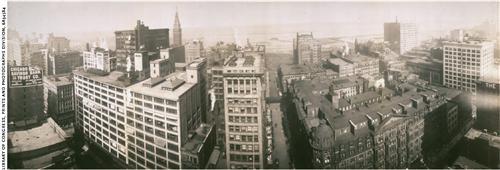
“We’re responsible for a large county. It’s a big boon for our office and for genealogy folks. We’re really excited,” says Kelley Quinn, spokesperson for the Cook County clerk’s office. “We think we’re going to be one of the only county offices in the country to have something like this.”
The records in the database will date back to the 1880s and, in compliance with Illinois privacy restrictions, stretch up to 1932 for birth certificates, 1957 for marriage certificates and 1987 for death certificates. The records won’t feature any Social Security numbers. “Any genealogy records we issue are considered noncertified records,” Quinn says.
Cook County’s vital records prior to Oct. 8, 1871, were destroyed in the Great Chicago Fire, explains Quinn. The state of Illinois didn’t mandate keeping residents’ vital records until 1916, so Quinn’s office is the only place you’re likely to find early birth and death certificates for Chicago residents.
Right now, copies by mail cost $15 and come with a typical four-to-six-week wait. If you don’t know the birth date, you have to pay extra for staff to search the files. But once the vital-records Web site is up and running, you’ll be able to type your relative’s name into a search engine. In the results, each match will show address information so you can narrow your search, as well as alternate name spellings so you can broaden it. Select the name and enter your credit card number to receive a copy of the certificate as a PDF file. As of press time, the office hadn’t yet determined a fee or a URL for the site. County clerk Richard Orr suggests checking <cookctyclerk.com> for updates.
The initiative was the talk of last October’s Illinois State Genealogy Society conference <rootsweb.com/~ilsgs/fallconf/2007falconf.html>, says Finding Your Chicago Ancestors (Lake Claremont Press) author Grace DuMelle. “Having complete indexes for the range of records available to [researchers]will be tremendous. For example, marriage licenses over 50 years old are open, but until now only two indexes have been compiled, neither one of which goes beyond 1916.”
Why is Cook County making its records readily available when many counties, fearing identity theft, are curtailing access by written requests, your identification and proof of familial relationships? “It’s just more cost-effective,” says Quinn. Although the project took about a year of planning, the scanning, which began last June, has been going relatively quickly. Digitizing the records also preserves the information in them — especially important because the originals are stored in a basement.
The site will be a plus for workers in the department, as well as for genealogists, explains Orr. “It’ll help genealogists because we’ll make it easier and more efficient to find the names they want. The more the genealogist can do, that certainly helps us.”
